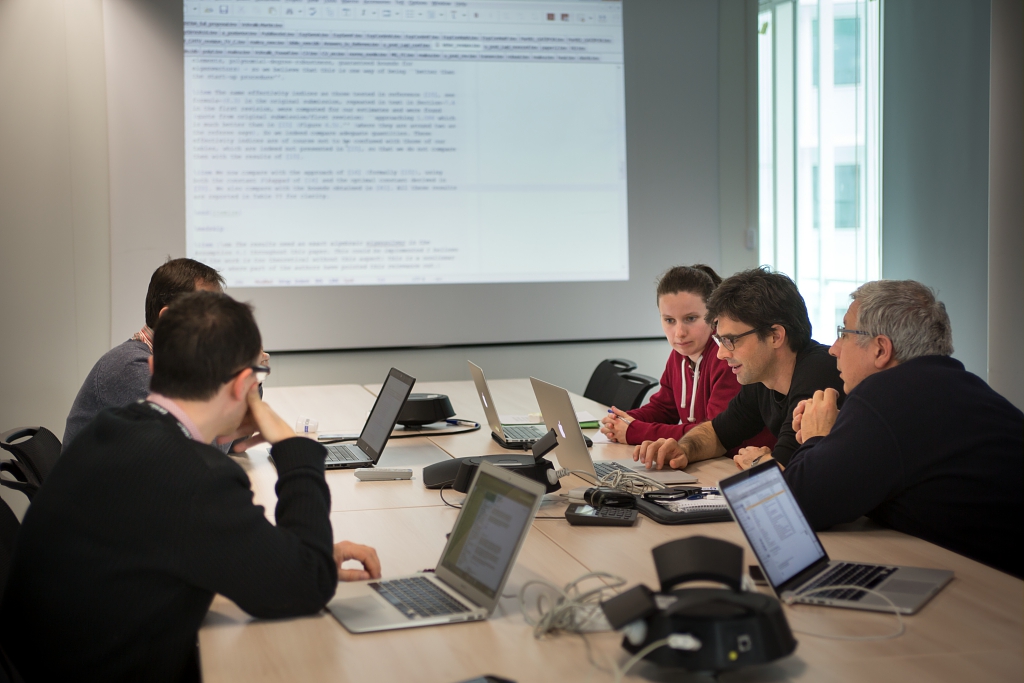2024 summer school on numerical analysis
Reduced Order Models: Bridging PDE Models and Simulation Data
Contenu
Reduced Order Models: Bridging PDE Models and Simulation Data
Scientific Context
This school aims to introduce hybrid numerical modeling methodologies that combine partial differential equation models with high-fidelity data. These methodologies focus on achieving explainability, accuracy, and robustness while maintaining speed and efficiency for performance prediction, parametric optimization, control, and data assimilation in complex industrial systems.
The preferred methodology in this school is Reduced Order Models (ROM). These parametric mathematical models are derived from partial differential equations by utilizing offline-calculated and stored solutions.
In certain applications, the solution space has low dimensionality, allowing for minimal degradation of accuracy against computational speed and model scalability. Thus, ROMs can address the computational complexity associated with the curse of dimensionality by significantly reducing it.
While ROMs have matured to a certain extent in the past decade, challenges persist. Parametric problems governed by advection fields or solutions with substantially compact support features, such as shockwaves, face difficulties in limited dimensional reduction and insufficient model generalization for out-of-sample solutions. These issues often result from a linear or affine approximation of the solution space, and the school will focus on specific techniques to address them.
Description of the Summer School
Initially, a general introduction to reduced modeling will be provided, emphasizing “projection-based” methods for elliptic or nonlinear hyperbolic problems.
Subsequently, challenges related to approximating solutions with essentially local spatial and temporal characteristics will be explored in detail. Various methodologies to overcome these challenges will be outlined, including nonlinear approximation techniques for dealing with fields where the movement of coherent structures is dominant.
Moreover, hybrid and multiscale formulations, combining reduced and full-order models, will be presented to optimally address locally complex solutions and complex geometric parameterizations.
Techniques such as Dynamic Mode Decomposition (DMD) and subspace interpolation will be discussed in this context.
Provisional Program
- Monday, July 1st 2024
- 8h30-9h, hall behind reception desk: coffee
- 9h-(break 30mn)-12h30, Amphi 1 : Lecture by Charbel Farhat « Introduction to model reduction, Empirical quadratures ECSW / Quadratic/nonlinear approximation »
- 14h-16h30, rooms A1.133-139-134-140 : Tutorial computer work by Jean-Philippe Argaud, Angélique Ponçot
- 17h-18h, Amphi 1 : Invited conference, by Lionel Mathelin
- Tuesday, July 2nd 2024
- 8h30-9h, hall behind reception desk: coffee
- 9h-(break 30mn)-12h30, Amphi 1 : Lecture by Angelo Iollo, Damiano Lombardi, Virginie Erlacher « Non-linear Interpolations/Mappings »
- 14h-16h15, rooms A1.133-139-134-140 : Tutorial computer work by par Angelo Iollo, Damiano Lombardi, Virginie Erlacher
- 16h30-17h30, Amphi 1 : Invited conference, by Charbel Farhat
- Wednesday, July 3rd 2024
- 8h30-9h, hall behind reception desk: coffee
- 9h-(break 30mn)-12h30, Amphi 1 : Lecture by Angelo Iollo, Damiano Lombardi, Virginie Erlacher « Non-linear Interpolations/Mappings »
- 14h-16h30, rooms A1.133-139-134-140 : Tutorial computer work by par Angelo Iollo, Damiano Lombardi, Virginie Erlacher
- 17h-18h, Amphi 1 : Invited conference, by Fabien Casenave
- Thursday, July 4th 2024
- 8h30-9h, hall behind reception desk: coffee
- 9h-(break 30mn)-12h30, Amphi 1 : Lecture by Tommaso Taddei « Component-Based Model Reduction / Décomposition de domaine »
- 14h-16h30, rooms A1.133-139-134-140 : Tutorial computer work by Tommaso Taddei, Angélique Ponçot, Jean-Philippe Argaud
- 17h-18h : Poster session
- 19h-23h : Diner
- Friday, July 5th 2024
- 8h30-9h, hall behind reception desk: coffee
- 9h-(break 30mn)-12h30, Amphi 1 : Lecture by Michel Bergmann, Denis Sipp « Dynamic Mode Decomposition (DMD). Subspace Interpolation »
- 14h-16h30, rooms A1.133-139-134-140 : Tutorial computer work by Michel Bergmann, Denis Sipp, Gael Poette
Practical informations
Date
01 july – 05 july 2024
Place
EDF Lab
Paris-Saclay
Boulevard Gaspard Monge
91120 Palaiseau
Contacts
Summer schools secretary
Régis Vizet – CEA
tel: 01 69 26 47 45
Fax: 01 69 26 70 05
Coordinators of the numerical analysis 2024 school
Angelo Iollo
Tommaso Taddei
Michel Bergmann
Gaël Poette
Jean-Philippe Argaud
Angélique Poncot


